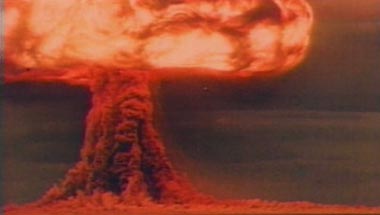

The Cold War has ended, but the threat of a nuclear nightmare may not be over. In "Russian Roulette," FRONTLINE investigates the safety and security of the Russian nuclear arsenal and the potential for accidental launch or diversion of its nuclear weapons.
In interviews with U.S. and Russian military commanders and nuclear experts, this report lays out the eroding physical, organizational and human elements of Russia's command and control system. For example, thousands of Cold War-era nuclear weapons remain on hair-trigger alert even though Russia's nuclear apparatus is deteriorating. In a January 1995 incident off the coast of Norway, Russian President Boris Yeltsin came within two minutes of launching a nuclear attack because of a faulty signal in Russia's early-warning system.
And Russia's economic crisis is worsening nuclear safety problems. Soldiers in the elite Strategic Rocket Forces were once well-paid and well-respected. Now, plummeting morale within the corps and among nuclear workers in general has become a great danger. In 1998 there were over a dozen alarming incidents of crime, hijacking attempts and unrest among military and nuclear personnel because of lack of staffing, housing and failure to pay military and workers' salaries.
In addition to chronicling problems confronting Russia's command and control of its nuclear arsenal, this FRONTLINE report also tracks the increasing potential of international terrorists obtaining Russia's nuclear weapons. High-level Russian military officials discuss why they believe nuclear suitcase bombs may have gone missing. And FRONTLINE reports on an undercover operation in Miami which turned into the first credible case of a scenario to smuggle tactical nuclear weapons into the U.S.
U.S. intelligence experts warn that lax security over Russia's 15,000 non-strategic tactical nuclear weapons present a much greater danger than an accidental inter-continental ballistic missile launch. As Matthew Bunn, former science advisor at the National Security Council, sums it up: "I think the US is much safer from the threat of an all-out devastating nuclear war than it was in 1991 at the end of the Cold War ... But I think if you ask the question: 'What is the probability that one nuclear bomb might go off somewhere in America--maybe a crude bomb from a terrorist or a rogue state--is that probability higher today?' I think the answer is definitely yes."
 |